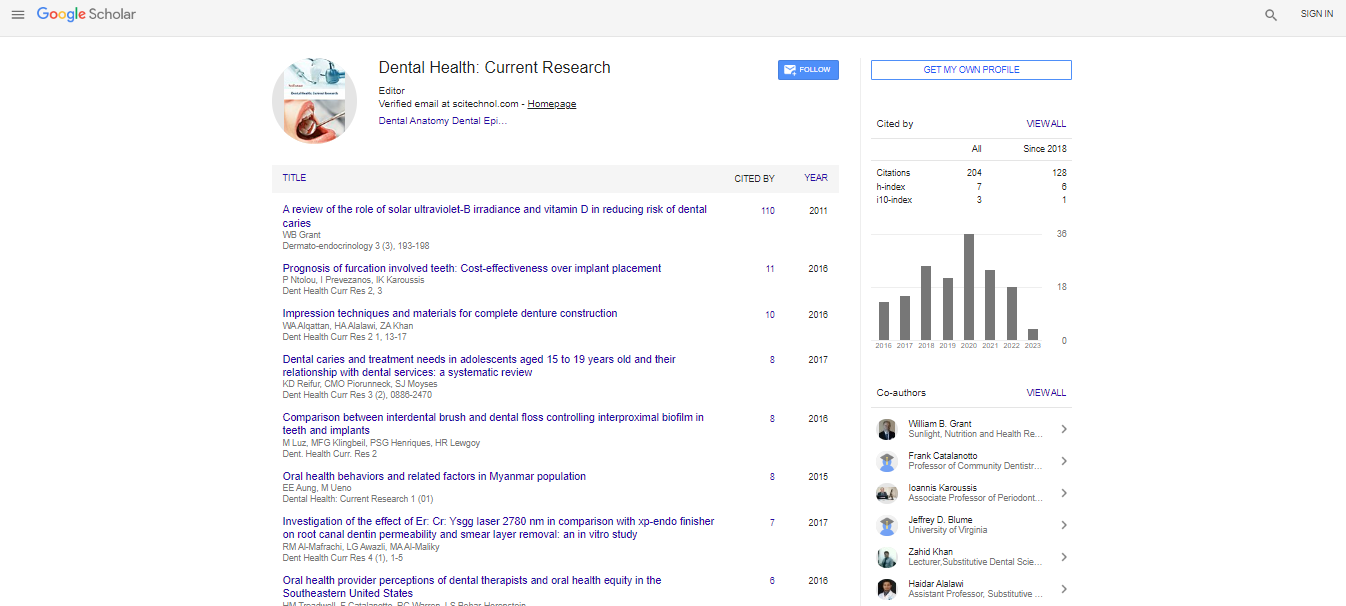Commentary, Dent Health Curr Res Vol: 9 Issue: 6
Discovering the Secrets of Hospital Dentistry
JKA Parker*
Department of Oral and Maxillofacial Surgery, East Surrey Hospital, Surrey, United Kingdom
- *Corresponding Author:
- JKA Parker
Department of Oral and Maxillofacial Surgery,
East Surrey Hospital,
Surrey,
United Kingdom;
E-mail: parkerjk45@23.ac.uk
Received date: 28 June, 2023, Manuscript No. DHCR-23-104181;
Editor assigned date: 30 June, 2023, PreQC No. DHCR-23-104181 (PQ);
Reviewed date: 14 July, 2023, QC No. DHCR-23-104181;
Revised date: 27 November, 2023, Manuscript No. DHCR-23-104181 (R);
Published date: 04 December, 2023, DOI: 10.4172/2470-0886.1000182
Citation: Parker JKA (2023) Discovering the Secrets of Hospital Dentistry. Dent Health Curr Res 9:6
Description
Hospital dentistry, often overshadowed by its clinical counterpart, encompasses a realm of oral healthcare that goes beyond the traditional dental clinic. While routine dental practices focus on preventive care and routine procedures, hospital dentistry delves into the complex and diverse aspects of oral health within a hospital setting.
Unveiling a multidisciplinary approach: Hospital dentistry embraces a multidisciplinary approach that extends beyond the boundaries of traditional dental care. Within the hospital setting, dental professionals collaborate with medical teams, anesthesiologists, surgeons, and other specialists to address the oral health needs of patients with complex medical conditions, special needs, or those requiring emergency care.
One of the primary facets of hospital dentistry lies in its ability to provide dental treatment to individuals who may be unable to receive care in a standard dental clinic due to medical fragility, physical or cognitive disabilities, or behavioral challenges. Through close coordination with healthcare teams, hospital dentists navigate these unique circumstances to ensure comprehensive and safe treatment delivery.
Emergencies and trauma care: Hospital dentistry plays a pivotal role in emergencies and trauma care. When accidents occur, oral injuries often accompany physical trauma. Hospital dentists are trained to manage dental emergencies, such as avulsed or fractured teeth, jaw fractures, and soft tissue injuries. Rapid intervention by dental professionals in these cases can help mitigate pain, prevent further complications, and contribute to the overall recovery process.
In the hospital setting, dental teams work alongside medical professionals to ensure comprehensive care for trauma patients. They assess and address dental injuries in conjunction with other healthcare providers, considering the patient's overall condition and coordinating treatment accordingly. This collaborative approach ensures that oral health concerns are not overlooked amidst the complexity of trauma care.
Operating room procedures: Hospital dentistry encompasses procedures performed in the Operating Room (OR). Patients who require complex oral surgeries, extensive dental reconstructions, or treatment under general anesthesia can receive optimal care in this controlled environment. Hospital dentists work closely with anesthesiologists and surgical teams to ensure patient safety and provide effective treatment while managing the associated risks.
The OR offers a sterile environment equipped with advanced technology and resources necessary for intricate dental procedures. Hospital dentists perform complex surgeries, such as orthognathic surgeries, dental implant placements, and maxillofacial reconstructions, addressing functional and aesthetic concerns. The collaboration between dental and surgical teams in the OR ensures a comprehensive approach to complex cases, maximizing patient outcomes.
Special populations and preventive care: Within the realm of hospital dentistry, a significant focus lies on catering to special populations. This includes individuals with physical or cognitive disabilities, geriatric patients, and those with chronic medical conditions. Hospital dentists are skilled in adapting their techniques and communication approaches to accommodate the specific needs of these patients, facilitating their access to oral healthcare.
For patients with disabilities or complex medical conditions, receiving dental care in a standard clinic may present challenges due to physical limitations or sensory sensitivities. Hospital dentistry provides a safe and accommodating environment for these individuals. Dental professionals collaborate with occupational therapists, nurses, and caregivers to ensure personalized care tailored to the unique needs of each patient.
Additionally, hospital dentistry places great emphasis on preventive care in vulnerable populations. Dental professionals work proactively to educate patients and caregivers on oral hygiene practices, conduct screenings for early detection of oral diseases, and implement preventive measures to safeguard oral health. By addressing oral health concerns in these populations, hospital dentistry plays a vital role in overall healthcare management and quality of life.
Hospital dentistry unravels the secrets that lie beyond the realm of traditional dental practice. Through its multidisciplinary approach, hospital dentistry addresses the complex oral health needs of patients in the hospital setting. From emergencies and trauma care to operating room procedures, hospital dentists play a vital role in comprehensive patient care. By catering to special populations and focusing on preventive care, they ensure equitable access to oral healthcare for all. Collaboration and innovation further drive the field of hospital dentistry, leading to advancements that positively impact patient outcomes.
 Spanish
Spanish  Chinese
Chinese  Russian
Russian  German
German  French
French  Japanese
Japanese  Portuguese
Portuguese  Hindi
Hindi 